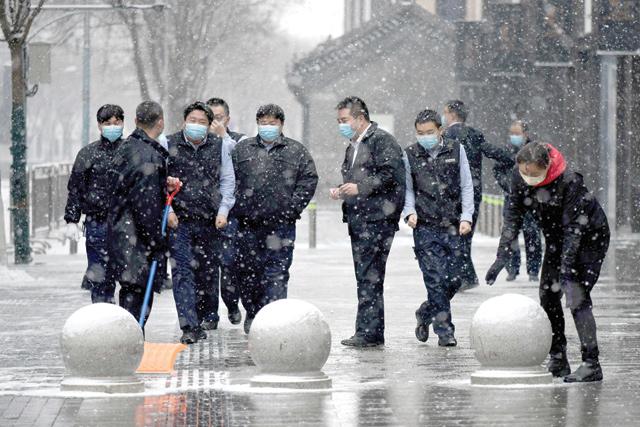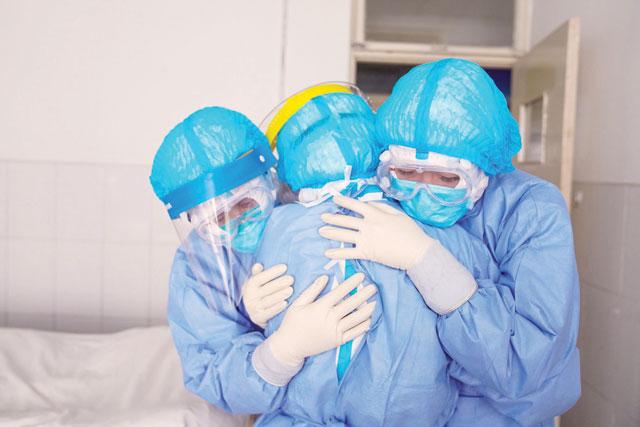You are here
China virus deaths rise as WHO says 'window of opportunity' to halt spread
By AFP - Feb 05,2020 - Last updated at Feb 05,2020

Staff members from a shopping mall wearing face masks prepare to clean the pavement of snow in Beijing on Wednesday (AFP photo)
BEIJING — The world has a "window of opportunity" to halt the spread of a deadly new virus, global health experts said, as the number of people infected in China jumped to 24,000 and millions more were ordered to stay indoors.
The confirmed death toll in mainland China rose to 490 after hardest-hit Hubei province reported 65 more people had died.
More than 20 countries have confirmed cases of 2019-nCoV, prompting the World Health Organisation (WHO) to declare a global health emergency, several governments to institute travel restrictions, and airlines to suspend flights to and from China.
But the WHO said Tuesday that dramatic measures taken by China offered a chance to halt transmission.
“While 99 per cent of cases are in China, in the rest of the world we only have 176 cases,” WHO chief Tedros Adhanom Ghebreyesus said.
“That doesn’t mean that it won’t get worse. But for sure we have a window of opportunity to act,” he said.
The WHO’s statement came as Singapore, Malaysia, and Thailand all reported new infections not imported from China.
And on Wednesday Japanese authorities said at least 10 passengers on a cruise ship carrying 3,711 people have the virus.
In a sign of growing concern about a spread to other densely-populated Chinese metropolitan areas, authorities in three more cities, including one near Shanghai, imposed drastic restrictions on movement.
Parts of Hangzhou — including the area where the main office of Chinese tech giant Alibaba is based — now allow only one person per household to go outside every two days to buy necessities, affecting some three million people.
The city is only 175 kilometres from Shanghai, which has reported more than 200 cases, including one death.
The disease is believed to have emerged in December in a Wuhan market that sold wild animals, and spread rapidly as people travelled for the Lunar New Year holiday in January.
China has struggled to contain the virus despite unprecedented measures, including virtually locking down more than 50 million people in Hubei province.
The WHO has said the outbreak does not yet constitute a “pandemic”.
But the head of the organisation, Tedros Adhanom Ghebreyesus, accused wealthy countries of falling short on their duties in sharing data.
“Of the 176 cases reported outside China so far, WHO has received complete case report forms for only 38 per cent,” he said.
Hong Kong’s first death
Hong Kong reported the first virus deaths on Tuesday as the semi-autonomous city closed all but two land crossings with the Chinese mainland.
Hong Kong media said the 39-year-old man had underlying health issues. He had visited Wuhan last month and his 72-year-old mother was also infected.
The financial hub has been particularly on edge over the virus as it has revived memories of the Severe Acute Respiratory Syndrome (SARS) outbreak of 2002-03, which killed nearly 300 people in the city and 349 people in the mainland.
Health officials noted that the mortality rate for the new coronavirus stood at 2.1 per cent, with most victims either old or with underlying health problems.
SARS killed nearly 10 per cent of patients.
New foreign cases
Singapore confirmed the first four cases of people being infected locally, taking the total number of infections in the city-state to 24.
Macau, China’s semi-autonomous gambling hub that is popular with mainland visitors, closed all of its casinos for at least two weeks.
And the UK Foreign Secretary Dominic Raab on Tuesday advised Britons to leave China, “if they can”, to minimise their risk of exposure to the virus.
The United States, meanwhile, acknowledged that the outbreak may delay Beijing’s plans to purchase American goods under the terms of a deal meant to end the two countries’ trade war.
Beijing admits ‘shortcomings’
China’s Communist leadership made a rare admission of fallibility earlier this week, acknowledging “shortcomings and difficulties exposed in the response to the epidemic”.
The Politburo Standing Committee called for improvements to the “national emergency management system” at the meeting, according to the official Xinhua news agency on Monday
The government also said it “urgently” needed medical equipment such as surgical masks, protective suits, and safety goggles as it battles the outbreak.
Most of the deaths have been in Wuhan and the rest of surrounding Hubei province, which has largely been under lockdown for almost two weeks.
A 1,000-bed field hospital in Wuhan built from scratch within two weeks to relieve overburdened medical facilities started receiving patients on Tuesday, with a second makeshift hospital due to open later this week.
A cultural building, an exhibition centre and a gymnasium have also been converted into improvised clinics with 3,400 beds.
State media reported that the city planned to convert an additional eight facilities into hospitals, highlighting the need for more capacity.
The makeshift hospitals in Wuhan should have a combined 10,000 beds, according to state media.
Related Articles
BEIJING — China faced deepening isolation over its coronavirus epidemic on Saturday as the death toll soared to 259, with the United States
WUHAN, China — China expanded drastic travel restrictions on Sunday to contain an epidemic that has killed 56 people and infected nearly 2,0
BEIJING — The death toll from the novel coronavirus surged past 800 in mainland China on Sunday, overtaking global fatalities in the 2002-03

















